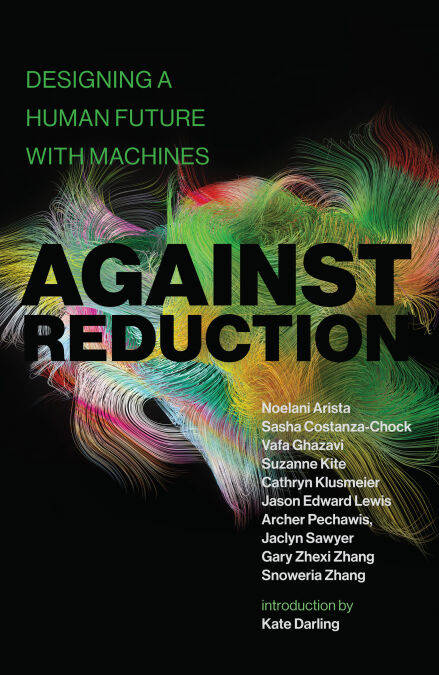
Bedankt voor het vertrouwen het afgelopen jaar! Om jou te bedanken bieden we GRATIS verzending (in België) aan op alles gedurende de hele maand januari.
- Afhalen na 1 uur in een winkel met voorraad
- In januari gratis thuislevering in België
- Ruim aanbod met 7 miljoen producten
Bedankt voor het vertrouwen het afgelopen jaar! Om jou te bedanken bieden we GRATIS verzending (in België) aan op alles gedurende de hele maand januari.
- Afhalen na 1 uur in een winkel met voorraad
- In januari gratis thuislevering in België
- Ruim aanbod met 7 miljoen producten
Zoeken
Against Reduction E-BOOK
Designing a Human Future with Machines
Noelani Arista, Sasha Costanza-Chock, Vafa Ghazavi, Suzanne Kite
E-book | Engels
€ 19,71
+ 19 punten
Omschrijving
Provocative, hopeful essays imagine a future that is not reduced to algorithms.
What is human flourishing in an age of machine intelligence, when many claim that the world’s most complex problems can be reduced to narrow technical questions? Does more computing make us more intelligent, or simply more computationally powerful? We need not always resist reduction; our ability to simplify helps us interpret complicated situations. The trick is to know when and how to do so. Against Reduction offers a collection of provocative and illuminating essays that consider different ways of recognizing and addressing the reduction in our approach to artificial intelligence, and ultimately to ourselves.
Inspired by a widely read manifesto by Joi Ito that called for embracing the diversity and irreducibility of the world, these essays offer persuasive and compelling variations on resisting reduction. Among other things, the writers draw on indigenous epistemology to argue for an extended “circle of relationships” that includes the nonhuman and robotic; cast “Snow White” as a tale of AI featuring a smart mirror; point out the cisnormativity of security protocol algorithms; map the interconnecting networks of so-called noncommunicable disease; and consider the limits of moral mathematics. Taken together, they show that we should push back against some of the reduction around us and do whatever is in our power to work toward broader solutions.
What is human flourishing in an age of machine intelligence, when many claim that the world’s most complex problems can be reduced to narrow technical questions? Does more computing make us more intelligent, or simply more computationally powerful? We need not always resist reduction; our ability to simplify helps us interpret complicated situations. The trick is to know when and how to do so. Against Reduction offers a collection of provocative and illuminating essays that consider different ways of recognizing and addressing the reduction in our approach to artificial intelligence, and ultimately to ourselves.
Inspired by a widely read manifesto by Joi Ito that called for embracing the diversity and irreducibility of the world, these essays offer persuasive and compelling variations on resisting reduction. Among other things, the writers draw on indigenous epistemology to argue for an extended “circle of relationships” that includes the nonhuman and robotic; cast “Snow White” as a tale of AI featuring a smart mirror; point out the cisnormativity of security protocol algorithms; map the interconnecting networks of so-called noncommunicable disease; and consider the limits of moral mathematics. Taken together, they show that we should push back against some of the reduction around us and do whatever is in our power to work toward broader solutions.
Specificaties
Betrokkenen
- Auteur(s):
- Uitgeverij:
Inhoud
- Aantal bladzijden:
- 128
- Taal:
- Engels
Eigenschappen
- Productcode (EAN):
- 9780262367325
- Verschijningsdatum:
- 4/10/2021
- Uitvoering:
- E-book
- Beveiligd met:
- Adobe DRM
- Formaat:
- ePub

Alleen bij Standaard Boekhandel
+ 19 punten op je klantenkaart van Standaard Boekhandel
Beoordelingen
We publiceren alleen reviews die voldoen aan de voorwaarden voor reviews. Bekijk onze voorwaarden voor reviews.









